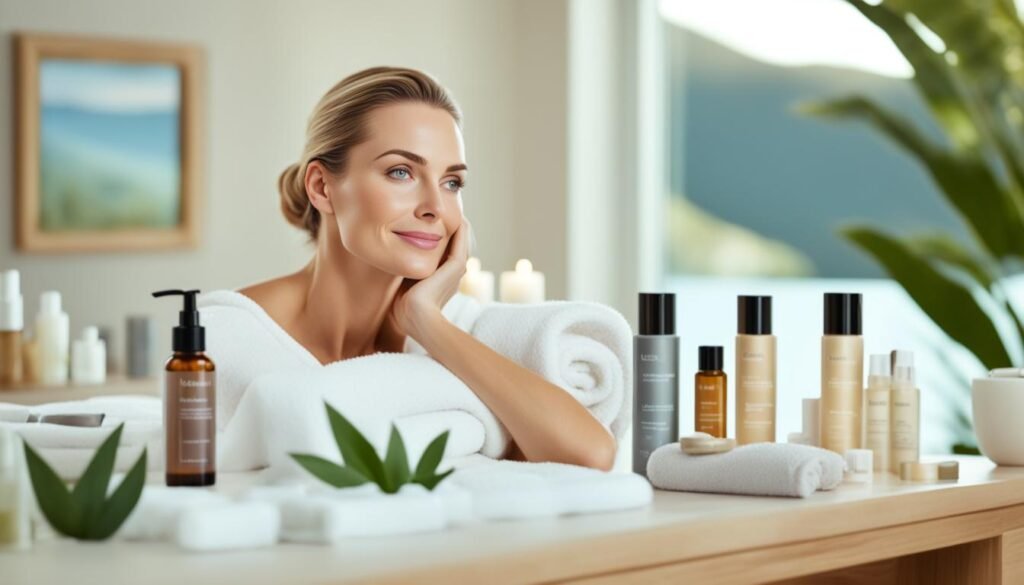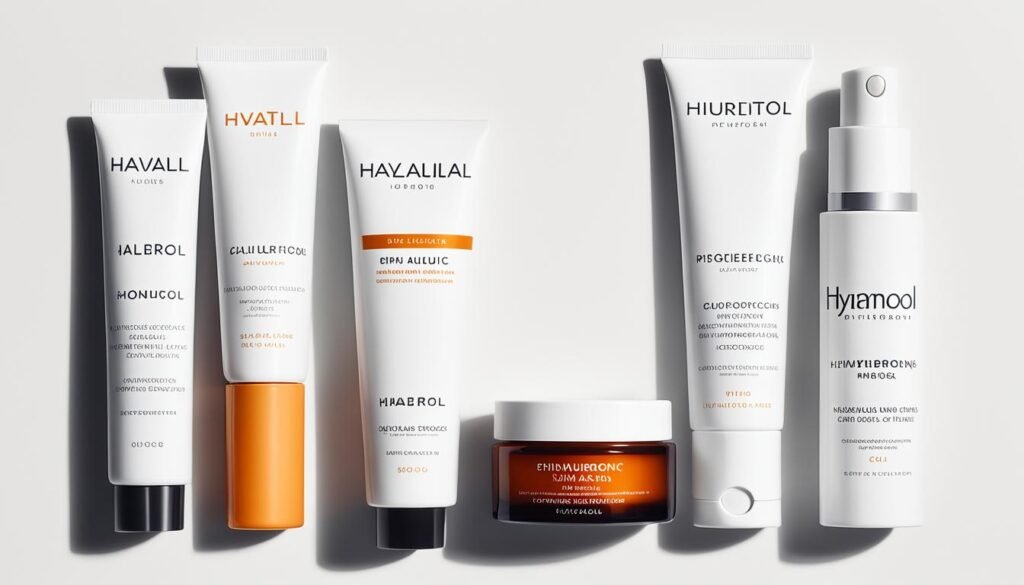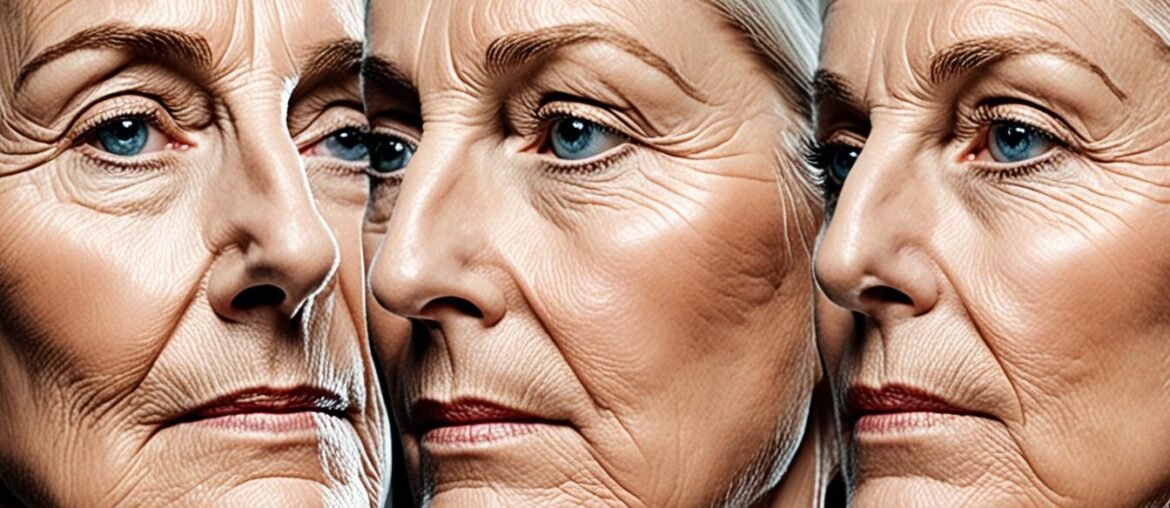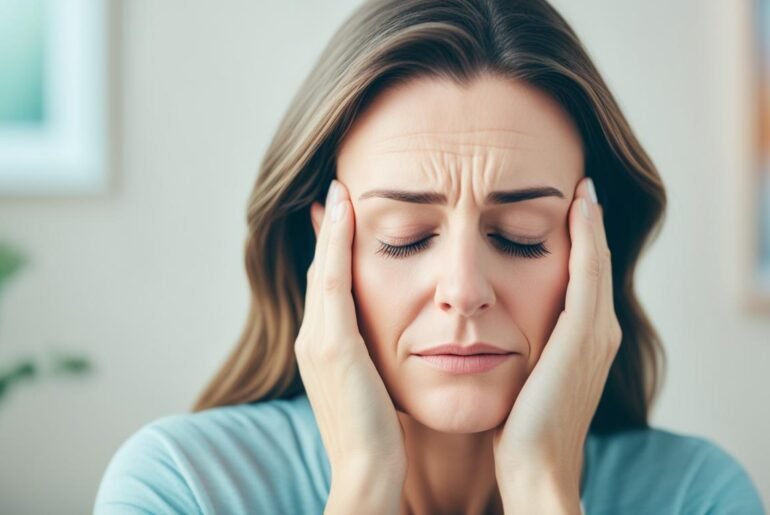Did you know that a high-stress lifestyle can make you look up to 3.5 years older? Stress-induced aging is a real phenomenon that can have visible effects on the skin. When we experience stress, our bodies release cortisol and other stress hormones, which can wreak havoc on our skin’s health.
Stress triggers dehydration, sallowness, roughness, and the formation of deep expression lines in the skin. If left unchecked, these effects can contribute to premature aging and the development of stress-related wrinkles.
But don’t worry, there are solutions available to help prevent and reverse stress-induced skin aging. By managing stress, adopting healthy habits, and using targeted skincare products, you can maintain a youthful and radiant complexion regardless of the stresses of daily life.
Key Takeaways:
- Stress-induced aging can make you look up to 3.5 years older.
- Stress triggers dehydration, sallowness, roughness, and deep expression lines in the skin.
- Managing stress and adopting healthy habits are crucial for maintaining youthful skin.
- Nourishing the skin from within through a balanced diet and hydration is important.
- A targeted skincare regimen can help combat the signs of stress-induced aging.
How Stress Impacts the Skin
Stress has a direct impact on the skin due to the release of cortisol and other stress hormones. These hormones can lead to dehydration, sallowness, roughness, and the formation of deep expression lines. In addition, stress can compromise the skin barrier, increase oxidative stress, shorten telomeres, and trigger glycation, all of which contribute to premature aging of the skin.
When we experience stress, our bodies go into a fight-or-flight response, triggering the release of stress hormones like cortisol. While cortisol is an essential hormone for our overall well-being, excessive and chronic stress can disrupt its delicate balance, leading to negative effects on the skin.
The skin is the body’s largest organ and serves as a protective barrier against external aggressors. However, prolonged stress can weaken this barrier, making the skin more vulnerable to damage. It can disrupt the skin’s natural moisture balance, causing dehydration and dryness. This can result in a dull, rough complexion and the formation of fine lines and wrinkles.
Furthermore, stress-induced hormonal imbalances can trigger inflammation and increase the production of free radicals, leading to oxidative stress. This oxidative stress can damage collagen and elastin, the proteins responsible for maintaining the skin’s firmness and elasticity.
Another effect of stress on the skin is the shortening of telomeres, which are protective caps on the ends of our DNA strands. Telomeres naturally shorten as we age, but stress can accelerate this process, leading to premature aging of the skin.
In addition, stress can stimulate the process of glycation, in which sugar molecules attach themselves to proteins like collagen and elastin. This process can result in the formation of advanced glycation end products (AGEs), which can make the skin stiff, less flexible, and more prone to sagging.
To summarize, the effects of stress on the skin are numerous and can contribute to premature aging. Understanding the impact of stress on our skin is essential in developing effective strategies to maintain its health and vitality.
The Importance of Stress Management

Managing stress is crucial for maintaining healthy skin and preventing stress-induced aging. The effects of stress on the skin can be harmful, leading to various issues such as wrinkles, dryness, and dullness. Fortunately, there are effective stress reduction techniques that can help improve both mental well-being and skin health.
Stress Reduction Techniques
Engaging in stress reduction techniques can significantly impact overall stress levels and promote healthy skin. Here are some effective techniques to consider:
- Meditation: Practicing meditation for a few minutes each day can help calm the mind, relax the body, and reduce stress levels.
- Deep Breathing Exercises: Deep breathing exercises are a simple yet effective way to instantly lower stress levels and promote relaxation. Taking slow, deep breaths can help activate the body’s relaxation response and reduce the release of stress hormones.
- Regular Exercise: Engaging in regular physical activity, such as walking, jogging, or yoga, can help alleviate stress and improve overall well-being. Exercise releases endorphins, the body’s natural feel-good chemicals, which can improve mood and reduce stress.
The Benefits of Stress Management for Healthy Skin
Implementing stress management techniques can have significant benefits for skin health. By reducing stress and its impact on the body, individuals can experience the following benefits:
- Improved skin tone and texture
- Reduced skin inflammation
- Enhanced skin barrier function
- Decreased skin sensitivity
- Reduced risk of stress-related skin conditions
- Promotion of a youthful and radiant complexion
Taking time for self-care and practicing mindfulness can also contribute to stress reduction and improved skin health. It’s important to prioritize stress management as part of a comprehensive skincare routine to achieve and maintain healthy, glowing skin.
Managing stress is not only beneficial for the mind but also for the skin. By adopting stress reduction techniques and incorporating self-care practices into your daily routine, you can promote healthy skin and achieve a youthful complexion.
Nourishing the Skin from Within
When it comes to preventing stress-induced skin aging, nourishing the skin from within is an essential strategy. Your diet plays a crucial role in supporting skin health and combating the damaging effects of stress. By consuming a balanced diet rich in vitamins, minerals, and antioxidants, you can feed your skin with the nutrients it needs to stay healthy and youthful.
Include plenty of nutrient-dense foods in your diet, such as fruits, vegetables, whole grains, lean proteins, and healthy fats. These foods are packed with essential nutrients that promote skin health and contribute to healthy aging. Vitamins like A, C, and E, as well as minerals like zinc and selenium, are particularly beneficial for the skin.
Antioxidants, such as those found in berries, dark leafy greens, and green tea, help protect the skin from oxidative stress caused by free radicals. These harmful compounds can lead to premature aging and skin damage. By incorporating antioxidant-rich foods into your meals and snacks, you can provide your skin with valuable protection.
It’s also important to limit your intake of sugary foods and beverages. Excessive sugar consumption can contribute to skin inflammation, glycation (a process that damages collagen and elastin), and accelerated aging. Opt for natural sweeteners like honey or opt for fresh fruit for a healthier alternative.
Hydration is another key aspect of nourishing your skin from within. Stress can often lead to dehydration, which can further exacerbate skin aging. Make sure to drink plenty of water throughout the day to keep your skin hydrated and counteract the dehydrating effects of stress.
| Key Nutrients for Skin Health: |
|---|
| Vitamin A: Found in fruits, vegetables, and dairy products, vitamin A promotes cell turnover and supports overall skin health. |
| Vitamin C: Citrus fruits, berries, and leafy greens are excellent sources of vitamin C, which boosts collagen production and helps protect against environmental damage. |
| Vitamin E: Nuts, seeds, and vegetable oils are rich in vitamin E, which is known for its antioxidant properties and ability to moisturize the skin. |
| Zinc: Seafood, lean meats, and legumes are zinc-rich foods that support wound healing and help maintain skin integrity. |
| Selenium: Brazil nuts, fish, and eggs are good sources of selenium, which works in conjunction with other antioxidants to protect the skin from damage. |
By nourishing your skin from within, you can give it the tools it needs to stay healthy and resilient, even in the face of stress. Combine a nutrient-rich diet with other stress management techniques and a targeted skincare regimen to keep your skin looking youthful and radiant.
Skincare Regimen for Stress-Induced Aging

In addition to stress management and a healthy lifestyle, implementing a targeted skincare regimen can effectively address the signs of stress-induced aging. By incorporating stress-reducing and hydrating products into your routine, you can combat the detrimental effects of stress on the skin and achieve a smoother, more youthful complexion.
To tackle stress-induced aging, consider incorporating the following ingredients into your skincare routine:
- Retinol: Known for its anti-aging properties, retinol helps minimize the appearance of wrinkles and fine lines caused by stress. It promotes cellular turnover and collagen production, restoring the skin’s elasticity and youthful glow. Look for products that contain a gentle yet effective concentration of retinol.
- Neuropeptides: These powerful peptides help calm the skin, reducing inflammation and redness caused by stress. Neuropeptides also stimulate collagen synthesis, improving the overall firmness and elasticity of the skin. Incorporate products with neuropeptides into your routine to combat the visible signs of stress-induced aging.
- Wild Indigo: This natural ingredient is known for its stress-reducing and soothing properties. Wild indigo helps alleviate the effects of stress on the skin, reducing inflammation and fatigue. Look for products that contain wild indigo extract to restore balance and radiance to stressed skin.
- Hyaluronic Acid: Stress-induced aging can lead to dehydrated skin, resulting in a dull and lackluster complexion. Hyaluronic acid is a powerhouse ingredient that attracts and retains moisture, providing intense hydration and plumping effects. Incorporate hyaluronic acid-infused products into your routine to promote a smoother and more supple complexion.
Integrating these stress-reducing and hydrating ingredients into your skincare routine can help combat the effects of stress on the skin, minimize the appearance of wrinkles, and provide essential hydration for a youthful and revitalized complexion.
Remember to perform a patch test before incorporating any new products into your skincare regimen and consult with a dermatologist if you have any specific concerns or skin conditions.
| Ingredient | Benefits |
|---|---|
| Retinol | Minimizes wrinkles and fine lines, promotes cellular turnover and collagen production |
| Neuropeptides | Calms inflammation, reduces redness, stimulates collagen synthesis |
| Wild Indigo | Reduces stress-related inflammation and fatigue, restores balance and radiance |
| Hyaluronic Acid | Provides intense hydration, plumps the skin, and promotes a supple complexion |
By incorporating stress-reducing ingredients into your skincare routine, you can effectively combat stress-induced aging and achieve a more youthful and revitalized complexion.
Healthy Habits for Youthful Skin
Adopting healthy habits is essential for maintaining youthful and healthy-looking skin. By incorporating these habits into your daily routine, you can promote skin health, prevent stress-related wrinkles, and support overall healthy aging.
Regular Exercise
Exercise plays a crucial role in promoting circulation and increasing blood flow to the skin. This increased blood flow delivers essential oxygen and nutrients, resulting in a radiant and youthful complexion. Aim for at least 30 minutes of moderate-intensity exercise, such as brisk walking, jogging, or cycling, most days of the week.
Sufficient Sleep
Getting enough sleep is vital for skin repair and regeneration. During sleep, the body goes through a process of cellular renewal, helping to reduce the signs of stress-induced aging. Aim for 7-9 hours of quality sleep each night to support optimal skin health.
Sun Protection
Protecting your skin from the sun’s harmful UV rays is crucial for preventing further skin damage and wrinkle formation. Always wear sunscreen with an SPF of 30 or higher, even on cloudy days, and reapply it every two hours when outdoors. Additionally, seek shade, wear protective clothing, and use sunglasses and a wide-brimmed hat to shield your skin from the sun.
Nourishing Diet
A healthy diet rich in fruits, vegetables, whole grains, and lean proteins provides the necessary nutrients to support skin health and combat the effects of stress. Include foods that are high in antioxidants, such as berries, leafy greens, and nuts, to fight free radicals and promote a youthful complexion. Stay hydrated by drinking plenty of water throughout the day, as dehydration can exacerbate the effects of stress on the skin.
Stress Management
Stress can take a toll on your skin, leading to premature aging. Engaging in stress management techniques, such as meditation, deep breathing exercises, and taking regular breaks to relax, can help reduce stress levels and minimize the impact on your skin. Prioritize self-care activities that bring you joy and help you unwind.
| Habits for Youthful Skin | Benefits |
|---|---|
| Regular Exercise | Promotes circulation for a radiant complexion |
| Sufficient Sleep | Allows the skin to repair and regenerate |
| Sun Protection | Prevents further skin damage and wrinkle formation |
| Nourishing Diet | Provides essential nutrients for skin health |
| Stress Management | Reduces the impact of stress on the skin |
Additional Tips for Preventing Stress-Related Wrinkles

Aside from managing stress and following a proper skincare routine, there are other lifestyle changes you can make to prevent stress-related wrinkles and maintain skin health.
1. Manage Stress Through Hobbies and Meditation
Finding activities you enjoy can help distract your mind from stressors and promote relaxation. Engaging in hobbies such as painting, gardening, or playing an instrument can be a therapeutic way to manage stress. Additionally, practicing meditation and mindfulness exercises can help calm the mind and reduce the release of stress hormones that contribute to skin aging.
2. Adopt a Healthy Diet Rich in Antioxidants
What you eat can directly impact your skin’s health and appearance. Adopting a balanced diet that includes foods high in antioxidants, such as fruits, vegetables, nuts, and seeds, can help combat the damaging effects of stress on the skin. Antioxidants help fight free radicals and reduce inflammation, supporting overall skin health and preventing stress-related wrinkles.
3. Avoid Vices That Can Accelerate Skin Aging
Smoking and excessive alcohol consumption can have detrimental effects on the skin, accelerating the aging process and increasing the risk of wrinkles. Quitting smoking and reducing alcohol intake can significantly improve skin health and prevent premature aging caused by stress.
4. Limit UV Ray Exposure and Wear Sunscreen
Excessive sun exposure can worsen the effects of stress on the skin and contribute to premature aging. To protect your skin, limit your time in the sun, especially during peak hours, and always wear sunscreen with a high SPF. Using a broad-spectrum sunscreen will shield your skin from harmful UV rays and help prevent the formation of stress-related wrinkles.
5. Work with a Primary Care Physician for Stress Management
If stress is significantly affecting your overall well-being and skin health, seeking professional help is essential. A primary care physician can help develop a stress management plan tailored to your specific needs. They may recommend techniques such as therapy, cognitive behavioral therapy, or stress reduction medications to help mitigate the impact of stress on your skin.
“Managing stress, adopting healthy habits, and making necessary lifestyle changes can significantly contribute to preventing stress-related wrinkles and maintaining skin health.”
| Lifestyle Changes for Wrinkle Prevention | Effectiveness |
|---|---|
| Managing stress through hobbies and meditation | 🌟🌟🌟🌟 |
| Adopting a healthy diet rich in antioxidants | 🌟🌟🌟🌟🌟 |
| Avoiding smoking and excessive alcohol consumption | 🌟🌟🌟🌟 |
| Limiting UV ray exposure and wearing sunscreen | 🌟🌟🌟🌟 |
| Working with a primary care physician for stress management | 🌟🌟🌟🌟🌟 |
Effective Skincare Products for Stress-Induced Aging

When it comes to combating stress-induced aging, targeted skincare products can be a game-changer. These products are specially formulated to address the unique needs of stressed skin, helping reduce the appearance of wrinkles and improve overall skin health.
Retinoid creams or serums are highly effective in reducing stress-related wrinkles. They work by stimulating collagen production, which helps improve skin elasticity and reduce the depth of wrinkles. Additionally, retinoids help even out skin tone and texture, giving you a smoother and more youthful complexion.
Vitamin C serums are another powerful tool in the fight against stress-induced aging. They are rich in antioxidants, which help combat oxidative stress caused by stress hormones. Vitamin C also boosts collagen synthesis, brightens the skin, and reduces hyperpigmentation, leaving you with a more radiant and youthful appearance.
To provide stress reduction and hydration benefits, look for skincare formulations that contain ingredients like neuropeptides and hyaluronic acid. Neuropeptides help to calm the skin and reduce the visible signs of stress, while hyaluronic acid replenishes moisture and plumps up the skin, diminishing the appearance of wrinkles and fine lines.
By incorporating these stress-reducing skincare solutions into your daily routine, you can effectively target stress-induced aging and promote a smoother, more youthful complexion.
Conclusion
Stress-induced skin aging is a genuine concern that can have visible effects on the complexion. However, by implementing effective stress management techniques, maintaining a healthy lifestyle, and utilizing targeted skincare products, it is possible to prevent and reverse stress-related wrinkles. Taking care of your skin from within by nourishing it with a balanced diet and staying hydrated, adopting healthy habits such as regular exercise and quality sleep, and incorporating stress-reducing ingredients in your skincare routine can help you maintain a youthful and radiant complexion regardless of the daily stresses you face.
Remember, managing stress is not only essential for overall well-being but also plays a significant role in the health of your skin. By practicing stress relief techniques, prioritizing self-care, and seeking professional guidance if needed, you can minimize the negative effects of stress on your skin and promote healthy aging.
Additionally, choosing skincare products specifically formulated to combat stress-induced aging can provide you with the extra support your skin needs. Look for ingredients like retinol, vitamin C, neuropeptides, and hyaluronic acid, which can help reduce the appearance of wrinkles and enhance the overall health of your skin.
FAQ
What is stress-induced skin aging?
Stress-induced skin aging refers to the visible effects that stress can have on the skin. High levels of stress can cause dehydration, sallowness, roughness, and the formation of deep expression lines.
How does stress impact the skin?
Stress triggers the release of cortisol and other stress hormones, which can lead to skin dehydration, sallowness, roughness, compromised skin barrier, increased oxidative stress, shortened telomeres, and glycation, all of which contribute to premature aging of the skin.
Why is stress management important for healthy skin?
Managing stress is crucial for maintaining healthy skin and preventing stress-induced aging. Stress management techniques such as meditation, deep breathing exercises, and regular exercise can help reduce the release of stress hormones and promote skin health.
How can I nourish my skin from within to prevent stress-induced aging?
Eating a balanced diet rich in vitamins, minerals, and antioxidants can support skin health and combat the effects of stress. Nutrient-dense foods, limited sugary indulgences, and proper hydration are essential for maintaining healthy skin.
What skincare regimen is recommended for stress-induced aging?
A targeted skincare regimen can help address the signs of stress-induced aging. Using products containing stress-reducing and hydrating ingredients, such as retinol, neuropeptides, wild indigo, and hyaluronic acid, can help combat the effects of stress on the skin and promote a more youthful complexion.
What healthy habits can promote youthful skin?
Engaging in regular exercise promotes circulation and increases blood flow to the skin, giving a radiant complexion. Getting enough sleep allows the skin to repair and regenerate, reducing the signs of stress-induced aging. Protecting the skin from the sun’s harmful UV rays is also important through the use of sunscreen and sun protection measures.
Managing stress through hobbies, meditation, and therapy, adopting a healthy diet rich in antioxidants, avoiding vices such as smoking and excessive alcohol consumption, limiting UV ray exposure, and developing a stress management plan with a healthcare provider can all help prevent stress-related wrinkles.
What are some effective skincare products for stress-induced aging?
Skincare products containing ingredients like retinoids, vitamin C, neuropeptides, and hyaluronic acid can help reduce the appearance of stress-related wrinkles and improve overall skin health. These products provide stress reduction and hydration benefits for a smoother and more youthful complexion.
How can I prevent stress-induced aging?
By managing stress through stress reduction techniques, maintaining a healthy lifestyle, nourishing the skin from within, and using effective skincare products, it is possible to prevent and reverse the signs of stress-induced aging, promoting a youthful and radiant complexion.




